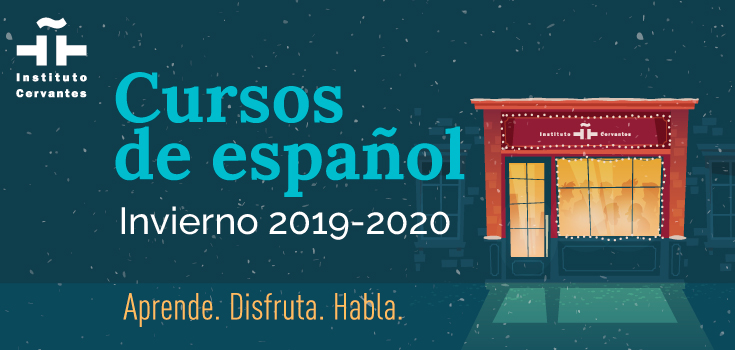Online Winter 2021 Spanish Courses
Due to the ongoing Covid-19 situation all our 2021 Winter Courses will be taught online in a friendly and supportive environment using video conferencing and distance learning tools. Check all our courses here.
VII Festival de cine español de Edimburgo: Programa escolar
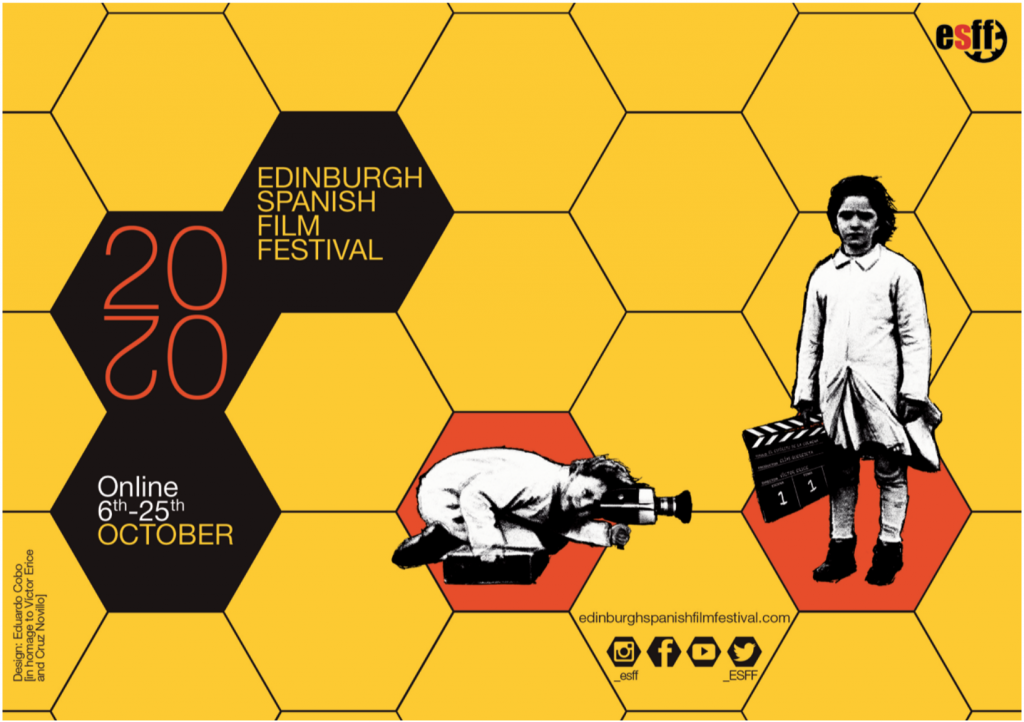
Vuelve el Festival de Cine Español de Edimburgo e incluye un Programa Escolar dirigido a estudiantes de “Spanish Learning”.
Debido al COVID-19, el formato será en línea y la película estará disponible durante 48 horas, a través de un enlace enviado a los profesores, que les permitiría acceder a ver las películas en clase dentro de un tiempo establecido.
En esta edición, las películas del Programa Escolar son:
- Los Futbolísimos (P7-S2)
- Pakete, Helena y sus compañeros de colegio se meten en todo tipo de aventuras en las que su ingenio y su amistad serán puestos a prueba. Todo para descubrir el misterio que podría acabar con su equipo de fútbol y con la continuidad de la pandilla. ¿Son víctimas de una conspiración o es todo fruto de la casualidad? Ha llegado el momento de hacer un pacto secreto y crear Los Futbolísimos con un objetivo claro: resolver el enigma y poder mantenerse juntos.
- Una vez más para (S3-S6)
- Abril regresa a su casa para el funeral de su abuela y al reencontrarse con su antigua vida empieza a pensar en recuperar todo lo que dejó atrás cuando se marchó hace cinco años al extranjero en busca de un futuro. Director: Guillermo Rojas.
Este programa para estudiantes de español les brinda la oportunidad de mejorar sus habilidades lingüísticas y su conciencia cultural. El ESFF también ha preparado un conjunto de actividades posteriores al visionado, disponibles para que los estudiantes profundicen en las películas y practiquen el vocabulario.
Más información, programa completo y entradas: www.edinburghspanishfilmfestival.com
El informe de lenguas del British Council confirma la primera posición del español en el bachillerato inglés
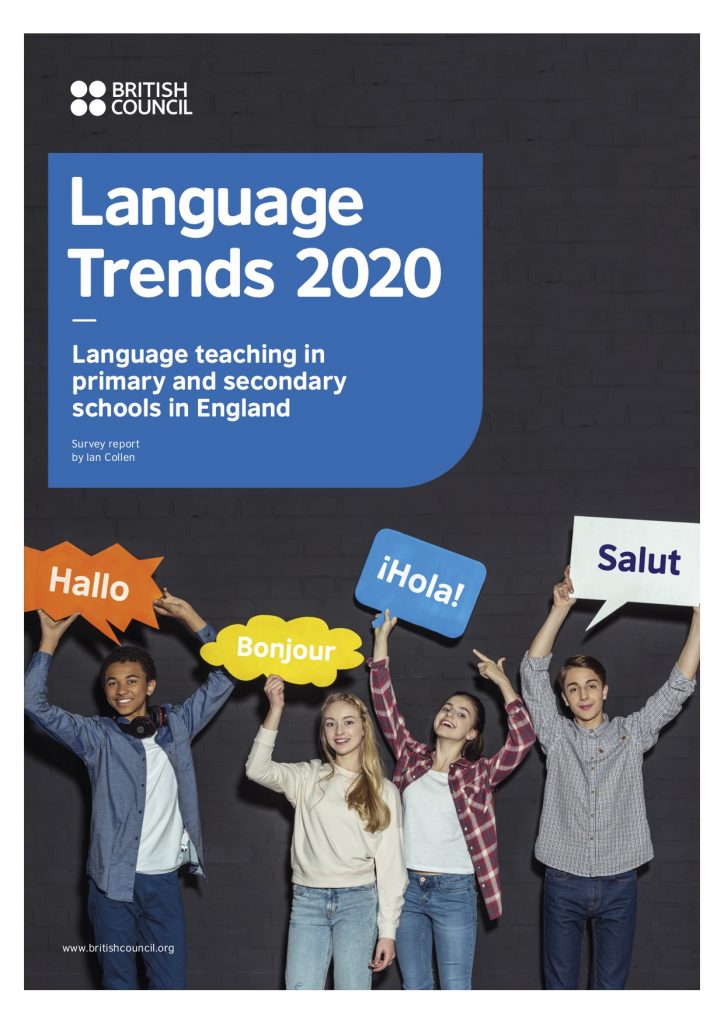
El español ocupa la primera posición en los exámenes del fin de bachillerato de Inglaterra, los llamados A-levels, con un aumento del 5% en 2019 respecto al año 2018, según los datos publicados hoy por el British Council en su informe anual Language Trends 2020.
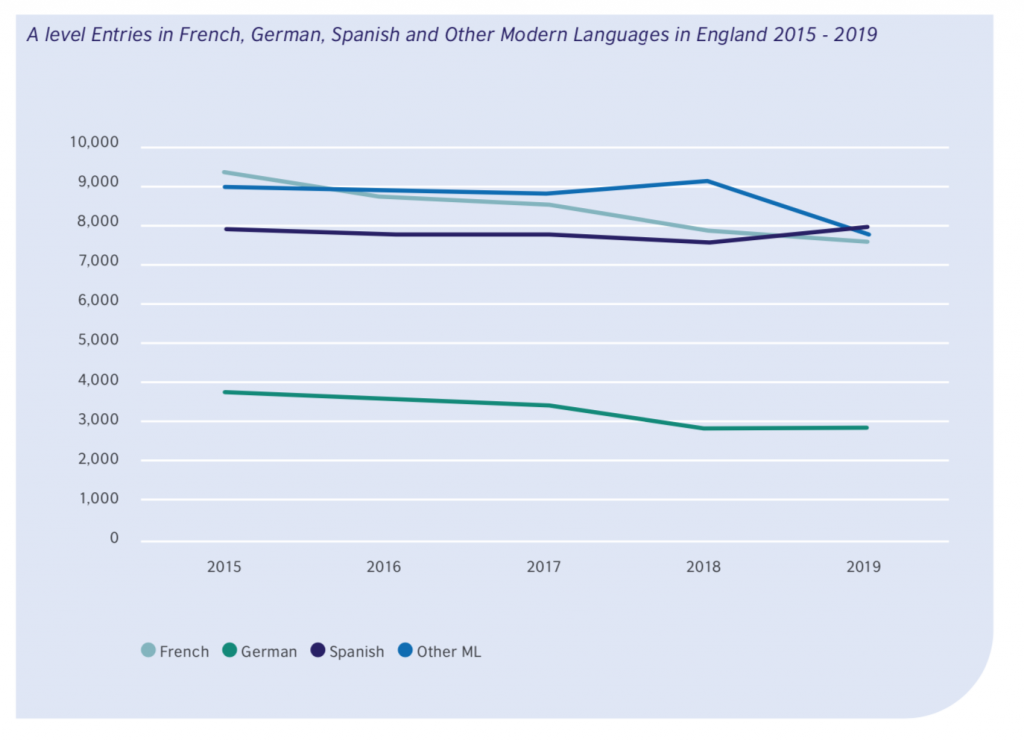
Entre el año 2018 y el 2019, los estudiantes de español, tanto en los exámenes de A-levels (fin de bachillerato) como en los exámenes de GCSE, que se realizan al acabar el Key Stage 4 (la secundaria británica), aumentaron un 7,5 por ciento, frente al 4% de los que se decantaron por francés. El total de alumnos que se examinaron de español en GCSE en 2019 fue de 96.811 y de A-levels 7.932.
Además, el informe predice que el español “superará al francés como la lengua más popular en 2030, o antes, si las tendencias actuales continúan”, citando datos del Joint Council for Qualifications (JCQ, por sus siglas en inglés).
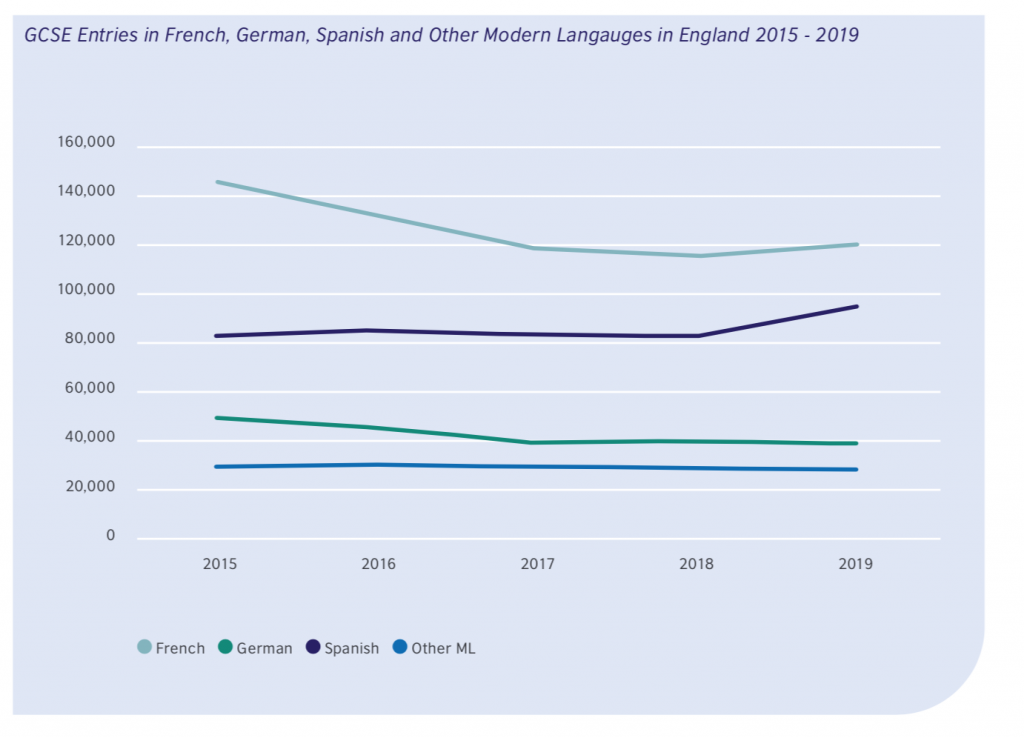
“Las cifras de estudio de lenguas extranjeras siguen siendo pequeñas, pero que el español ocupe la primera posición por primera vez en la historia es indicativo de cambios profundos. Cambios que nos hablan del peso creciente del mundo hispanohablante y su correlato en un país acostumbrado a pensar globalmente, como es Gran Bretaña”, aseguró el director del Instituto Cervantes de Londres, Ignacio Peyró.
El Language Trends es el estudio anual sobre tendencias de la docencia de lenguas extranjeras en Inglaterra, encargado por el British Council, y que proporciona datos sobre qué lenguas se enseñan en los centros de secundaria –tanto en los financiados con fondos públicos como en los centros privados– en las diferentes etapas educativas.
El Instituto Cervantes y el British Council firmaron en noviembre de 2019 su primer convenio de colaboración a escala global.
«I am enormously grateful to all at Instituto Cervantes London who conspired to get me over the finish line»
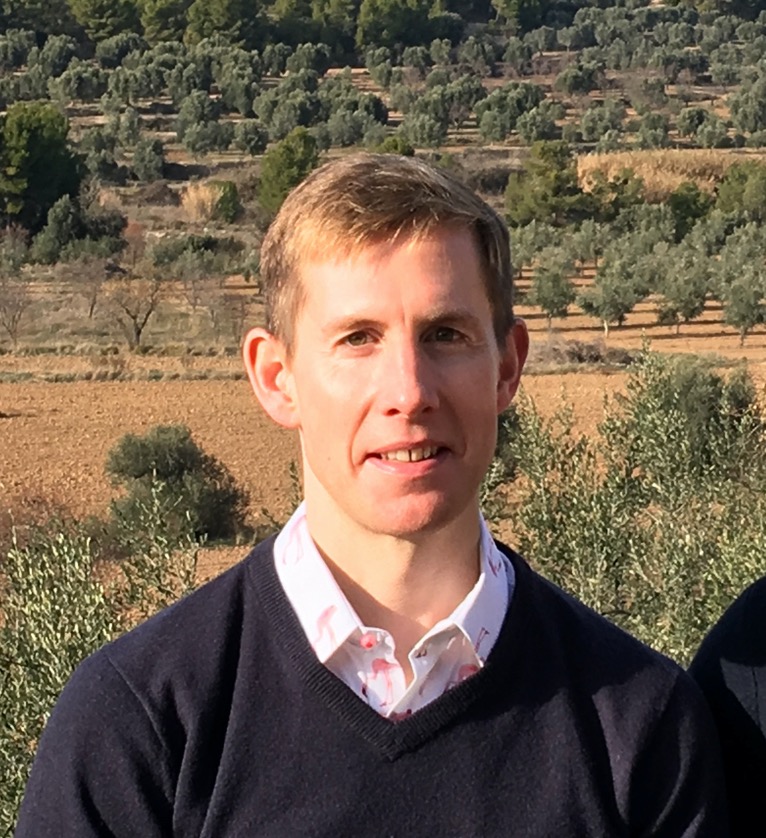
Today we chat with one of our students, Joseph McGowan, who just passed DELE C2 exam and previously achieved DELE C1. Joseph has studied Spanish at Instituto Cervantes in London for a long time and he prepared himself for this exam with our teachers. He enjoys learning Spanish every week and travelling to the beautiful Catalonian town of Sitges.
¿Why did you decide to take DELE exam?
I decided to take the DELE exam, not out of any academic, professional or administrative necessity, but simply as a personal challenge. I wanted to learn Spanish, but I knew I had to have a deadline, otherwise I’d pootle along aimlessly. Procrastination is an art form I’ve mastered, so I needed some impetus to turn the desire to learn into a reality. Also, with years of unstructured learning of French under my belt, I knew that the vague target of «I want to speak a language» can be like trying to reach the end of the rainbow: you never quite get there; there’s always a bit further to go. The feeling you can speak a language successfully comes and goes like the weather, depending on mood, physical state, subject-matter, interlocutor, etc. So I wanted an objective and solid milestone by which to measure my progress.-
How was the preparation? What was the most difficult part for you?
Without doubt, the writing was the most difficult element. I was a terrible schoolboy, never did my homework, didn’t take any further exams after my GCSEs, so once again being faced with The Demon Blank Sheet of Paper waiting to be filled was not only an academic but also a psychological barrier to break through. Fortunately I had a fantastic teacher who was extremely patient and generous with her time and effort. She offered to be my sherpa to guide me up the mountain to the exam. And that mountain certainly did seem steep, and rocky. But once I got there, it was amazing to look back and see how far I’d come.
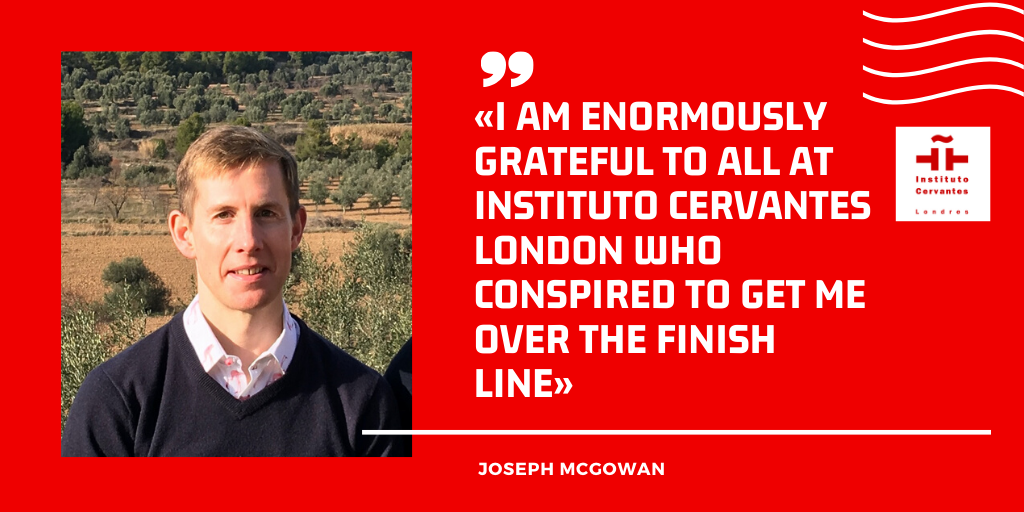
How did the DELE preparation classes at Instituto Cervantes London help you?
As you’ll have gathered, for me the classes were indispensable. Left to my own devices, I could never have passed the C1 and C2 exams. At an advanced level, even in their native tongue, I think someone would struggle to pass a CEFR language exam without preparation. You have to know the format of the exam; for the writing, there are models of text you may not be familiar with; and learning to manage the time in the exam is essential and, at least to me, did not come naturally. My teacher carefully planned each class so there was a progression, which stopped me spending too much time on one particular element at the expense of another. She was there to remind me that you only have to be good enough to pass the exam, there’s no point in trying to exceed the requirements. Of course, perfection is the enemy of good, but it’s sometimes hard to judge alone. In the moments when my determination wobbled and I thought, «Why am I putting myself through this?», I knew I couldn’t let her down and back out now, after we’d both invested so much time and effort.
Looking back, the fact I embarked upon this journey in my 40th year probably isn’t a coincidence. At a time of taking stock of one’s life, it’s not a bad way to live out a mid-life crisis! I am enormously grateful to all at Instituto Cervantes London who conspired to get me over the finish line (twice). The journey is not over, of course — I am now working on Spanish literature with my teacher — but I am very pleased, even proud, to have put those two important milestones behind me.
If you want to take a DELE exam, you can enrol through the online shop of Instituto Cervantes London (CLIC Londres).
These are the upcoming exam sessions at Instituto Cervantes London:
- 11 September (written and oral exam), DELE for Young Learners: Levels A1 and A2/B1
Enrolment deadline 15 July - 11 September (written exam), 11/12 September (oral exam). Level A1, A2, B1, B2, C1, C2
Enrolment deadline 15 July - 13 November (written and oral exam), DELE for Young Learners: Levels A1 and A2/B1
Enrolment deadline 7 October - 14 November (written exam), 13/14 November (oral exam). Levels: A1, A2, B1, B2, C1, C2
Enrolment deadline 7 October
Oxford celebrates its «valuable relationship» with Instituto Cervantes in the 50th anniversary of the Spanish Faculty
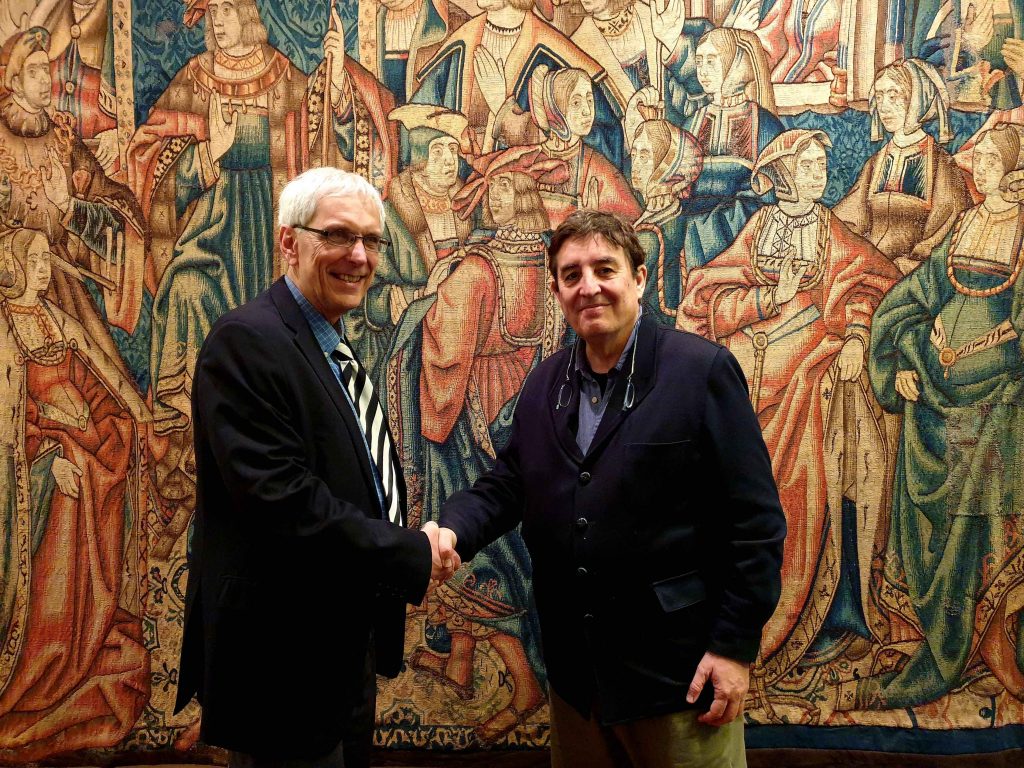
The director of Instituto Cervantes, Luis García Montero, attended today the 50th anniversary celebrations of the Spanish and Portuguese Sub-Faculty at the University of Oxford. Tomorrow, he will sign a memorandum of understanding (MOU) with Magdalen College.
“The participation of Instituto Cervantes in this commemoration is due to the fact that our relationship is very valuable,” said Jonathan Thacker, Professor Alfonso XIII of Spanish studies at Oxford, who explained that although Spanish has been taught at this university for more 100 years, only now does he feel that «it is a really vibrant language».
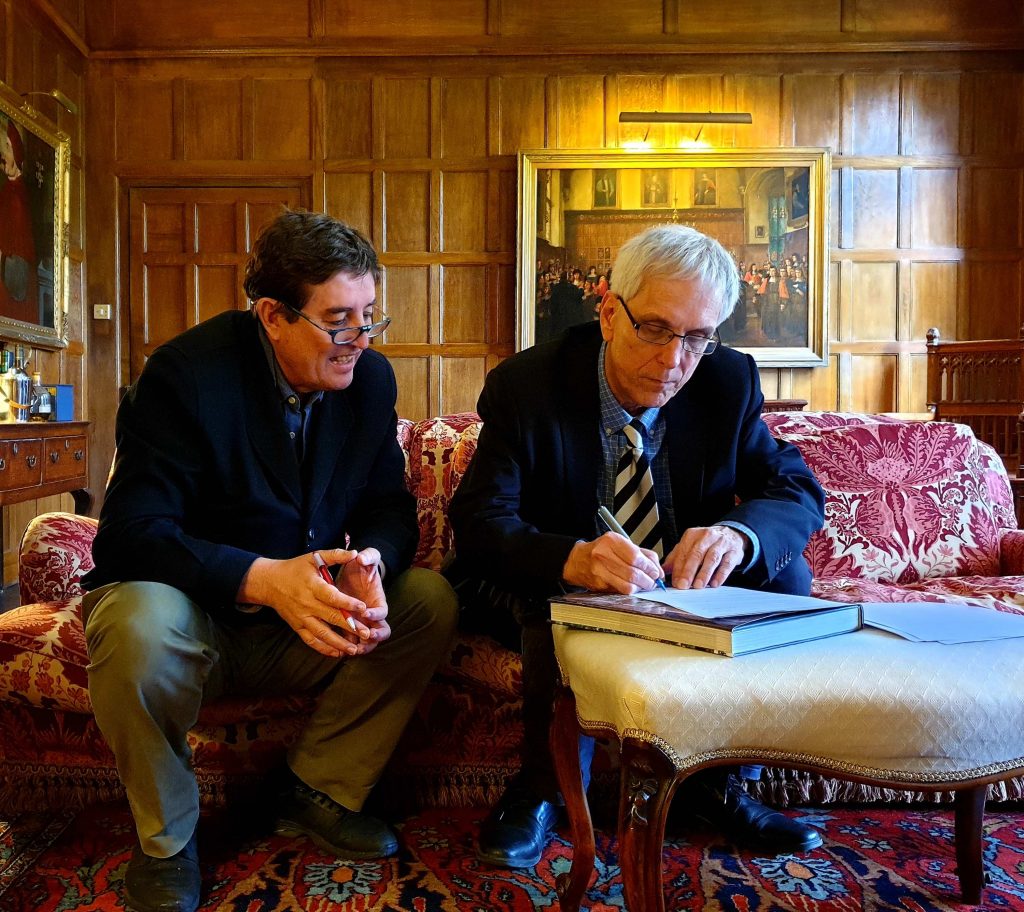
Expert in the Spanish Golden Age, Professor Thacker said that García Montero’s assistance “is not only because he is the director of a very important cultural institution, but also an academic and a poet, producing a type of literature that we teach in Oxford. We wanted this celebration to be a combination of academic content and more vivid content.” Alongside the celebration, there were poetry readings by García Montero himself and Portuguese writer Ana Luísa Amaral to enliven and complement the anniversary.
Memorandum of Understanding with Magdalen College
“This agreement is a recognition of a trajectory that has been underway for a few years and the consolidation of a future collaboration that I wish to be very long. It is about putting in black and white what has been developing for a long time, especially in these last two years,” said the professor of Spanish Medieval Literature and Philology at the University of Oxford, Juan Carlos Conde.
For Conde, the signing of this memorandum is to give, «a naturalisation certificate and secure it for the future.” In fact, it is clear that the presence of Spanish in Oxford is strengthened with two initiatives mentioned in the MOU: the Madariaga Series and the Magdalen Iberian Medieval Studies Seminar (MIMSS).
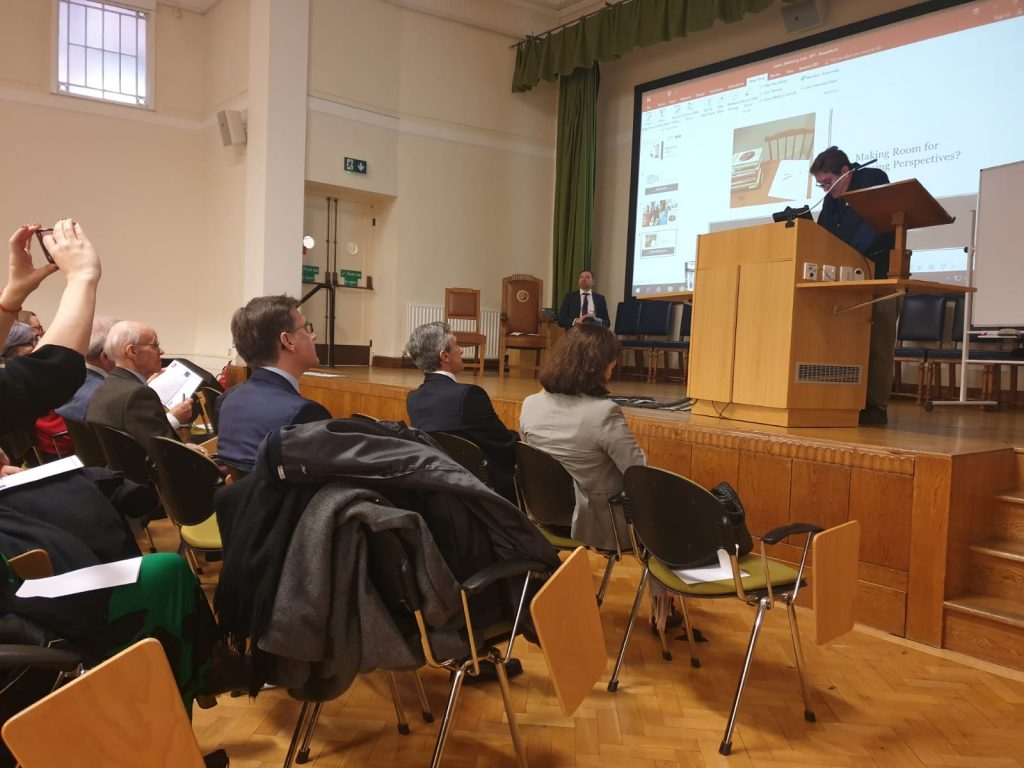
The Madariaga Series is the result of an initiative by a group of postgraduate students at the end of year 2014. Among the first guests in 2015 were figures such as Miguel Ángel Moratinos and Javier Solana. One of the students behind the initiative, Diego Rubio, approached Conde to ask whether Magdalen College could give the series voice and visibility in Oxford. A few months later, they successfully gave the Madariaga Series a “home, roof and shelter, as well as a significant economic contribution.» In the case of the MIMSS cycle, it is the most important medieval studies seminar in the United Kingdom today.
“I want to believe that these activities, in parallel to teaching and training, will contribute to the experience of current and future Oxford students, providing them with a series of opportunities they don’t have in other places,” said Conde.
Spanish students in Oxford
“For undergraduate students who want to study here, they must have previously studied Spanish up to A-levels exams. We have an average of between 300 and 320 students who request to study here and we accept between 70 and 75, that is, one in four students. I think this is a sign of the good health of teaching Spanish in schools,” said Professor Thacker.
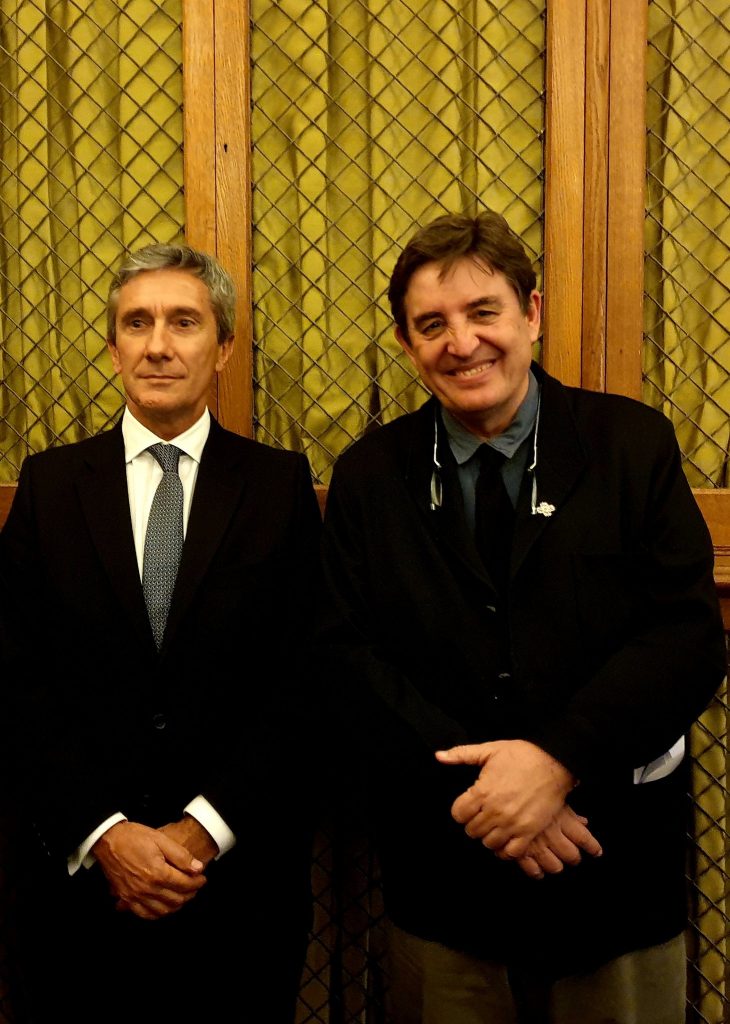
Twenty years ago, when this professor began working at Oxford, there was an average of approximately 150 applicants for 40 positions. «We have grown a lot, but the big difference is that there are more applications for Modern Languages, because when students apply to study here, they have to choose that route and then specify if they want Russian, Italian, Spanish or what language,» he pointed out.
While interest in French and German is going down, Spanish has broken that trend, and at the moment, there is still a good level of applicants: “I hope it is because they like the level of our course, but also because there are a lot of young people here interested in Hispanic culture and Spanish history, and want to travel and like to travel to countries where Spanish is spoken. ”
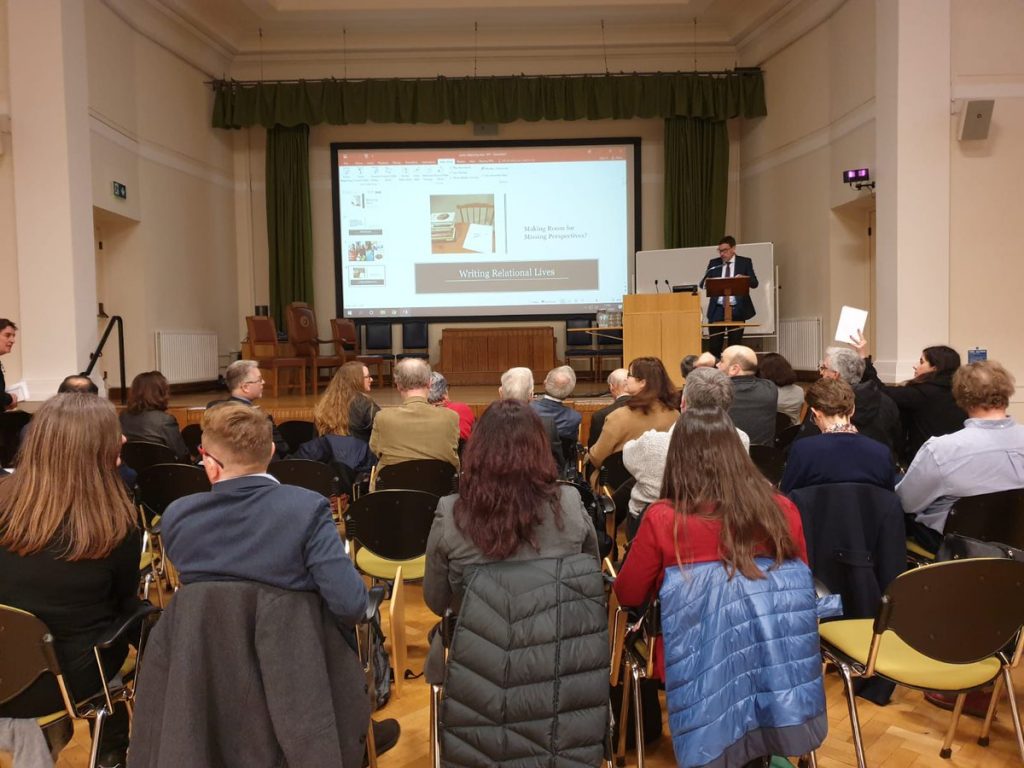
Future of the Spanish language
Thacker would like to continue seeing Spanish growing in the coming years and that the Sub-Faculty of Medieval and Modern Languages at the University of Oxford is able to accept all good applicants for Spanish studies, both undergraduate and graduate. Alongside this growth is also an impetus on always maintaining the current level of interdisciplinary interaction and with other Sub-Faculties in Oxford that there are today.
Spain recognises the work of the great British historian, Paul Preston
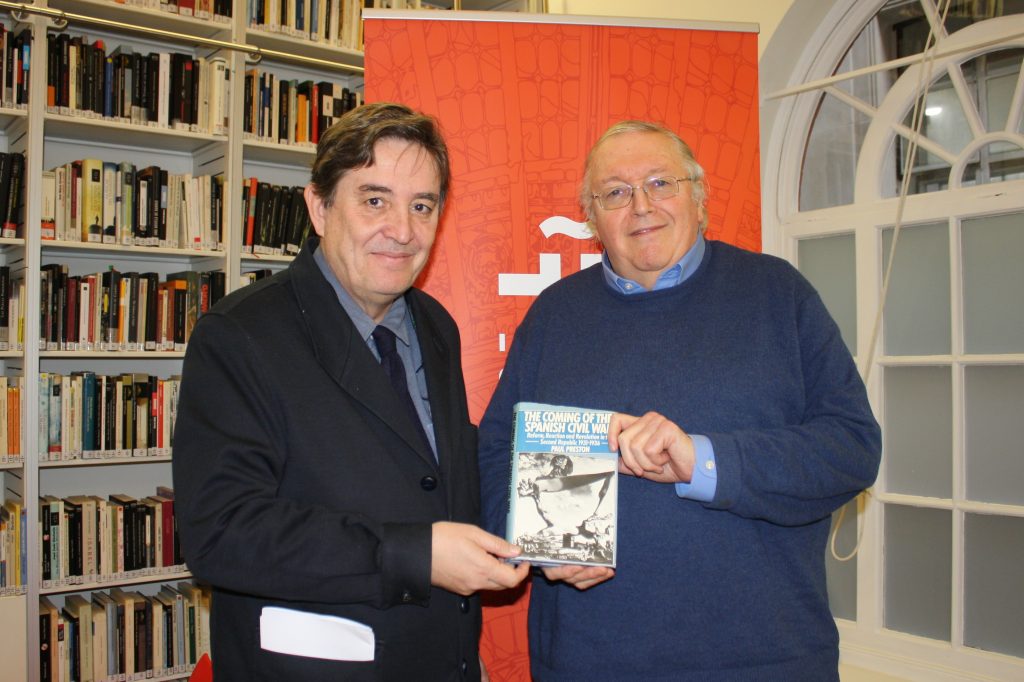
The British historian and Hispanist Sir Paul Preston (Liverpool, 1946) will make an announcement in London on February 28th, that he has chosen to leave a copy of the first book he published in the Caja de las Letras, Instituto Cervantes’ headquarters in Madrid.
The Caja de las Letras is a vault of safe-deposit boxes in a former bank building that has been repurposed as a time capsule for Hispanic culture. Many Spanish artists and thinkers have been invited to leave an artifact of their choosing in the security boxes, along with the date the safe should be reopened.
In the case of Sir Paul Preston, he has chosen a book based on his thesis, The Destruction of Democracy in Spain (1978) which contains notes written by Hispanist Sir Raymond Carr. The first box ever used was Number 1,000 and was filled by writer Francisco Ayala in 2007. And for the first time in the history of the boxes, Preston’s donation is going to be done away from Madrid.
As Sir Paul Preston suffers from specific health problems that prevent him from travelling to Spain, his donated book will be taken to Madrid in a red briefcase guarded by the director of Instituto Cervantes, Luis García Montero.
«It is a great honor to join the Caja de las Letras, especially when it seems that there are very few writers who are not Spanish-speaking, and that has moved me,» said the British historian, who chose to open his box in five years time.
The text, a documented study that traces the origins of the Spanish Civil War, was started from the doctoral thesis that he presented at the University of Oxford about the monarchical conspiracies against the Spanish Republic. It is a copy much valued by Sir Paul Preston because of the annotations from his teacher, British historian and Hispanist Sir Raymond Carr (1919-2015).
“If you leave an object without further ado, for me it does not have much interest for those who open the Caja de las Letras in the future. That is why I thought that if someone interested in my work opens it, this has twice the interest, since it is my book and is annotated by Raymond Carr. In addition, this copy arrived to me in a very strange way: a friend found it in a second-hand bookshop and then he gave it to me,” explained Sir Paul Preston.
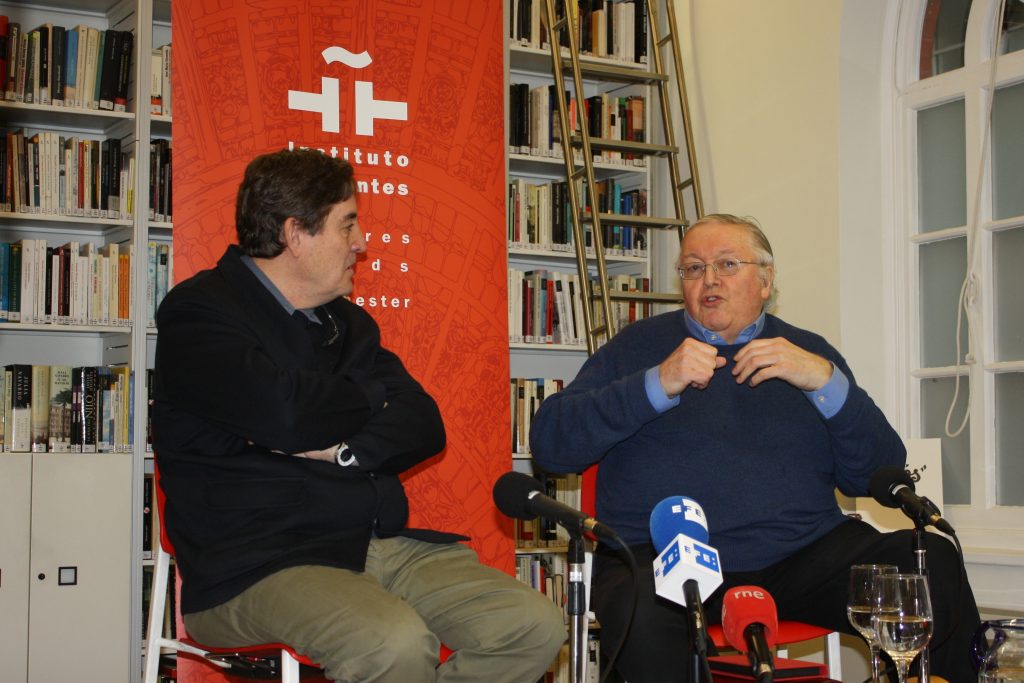
Disciple of Hugh Thomas
Sir Paul Preston’s childhood was spent in a working-class neighborhood of Liverpool, a city heavily punished by German bombing during World War II, as it was the port that received food and weapons shipments from the United States.
«I was born just after the War, but in my childhood the conversations of adults were very much about the bombings and the blitz, which came from the German expression blitzkrieg, quick war.» Very soon those stories became my favorite readings when I reached adolescence and I began to be interested in reading, above all, about the origins of World War II,” said the British historian.
Sir Paul Preston considered that he had «really incredible luck» for a working-class boy and from the North in being able to study History at Oxford University. «It was a small miracle and I was hoping, but among the subjects there were few which really impassioned me: almost everything was Constitutional History,» he added.
At the end of the race, and «wanting more», Sir Paul Preston again had «immense luck» when he was offered a scholarship to a postgraduate course on the period of Entreguerras (1918- 1939) at the University of Reading. “One of the subjects, the one that dealt with the Spanish Civil War, was given by Hugh Thomas. There I started teaching with him and everything fascinated me.”
From that moment, Sir Paul Preston began to «eat books» and read everything in English about the Spanish Civil War, realising that it was the perfect topic for his doctoral research: «It was a pandora box in which there was everything, fascism, communism, socialism, Freemasonry and great international figures (Stalin, Hitler, Trotsky…), etc.”
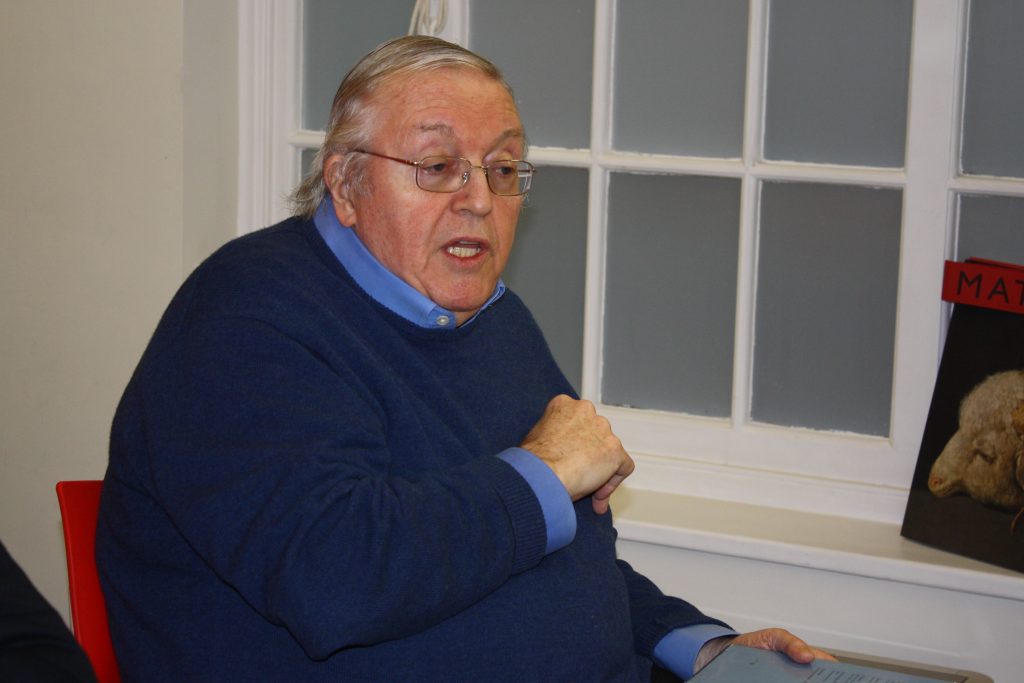
First trip to Spain
It was at that time that Sir Paul Preston decided that he «had to learn Spanish» and began to practice it with Colombian students in the cafeteria of the University. He traveled to Spain for the first time in the late 60s: “It was a great crush because Spain at that time had little to do with Spain today. I remember walking the streets of Madrid, the smells of food and the work of artisans.”
Sir Paul Preston acknowledged that he felt in love with Spain and was very excited with “the welcome that people gave me, I don’t know if it is like that now, but for someone who only babbled a couple of words in Spanish, people were very warm and they loved to see you and try to improve your Spanish, quite the opposite than in other countries.”
A life dedicated to the study of the History of Spain
Sir Paul Preston is a Doctor in History at the University of Oxford. He is a member of the British Academy and director of the Canada Blanch Centre of the London School of Economics, where he was Professor of International History for many years. Preston enjoys global fame as one of the greatest experts in the Spanish Civil War. He is also the author of reference biographies for Franco and Juan Carlos I.
Specialist in contemporary Spain, the historian has received the Commendation of the Order of Civil Merit and the Grand Cross of the Order of Isabel la Católica. Among his most outstanding works are Revolution and War in Spain 1931-1939 (1986); The Spanish Civil War (1987); Franco, leader of Spain (1994); Juan Carlos I (2003); The Spanish Holocaust (2011); the biography of Santiago Carrillo The red fox (2013), and his most recent and monumental work, A betrayed people: Spain from 1876 to the present day: Corruption, political incompetence and social division (2019).
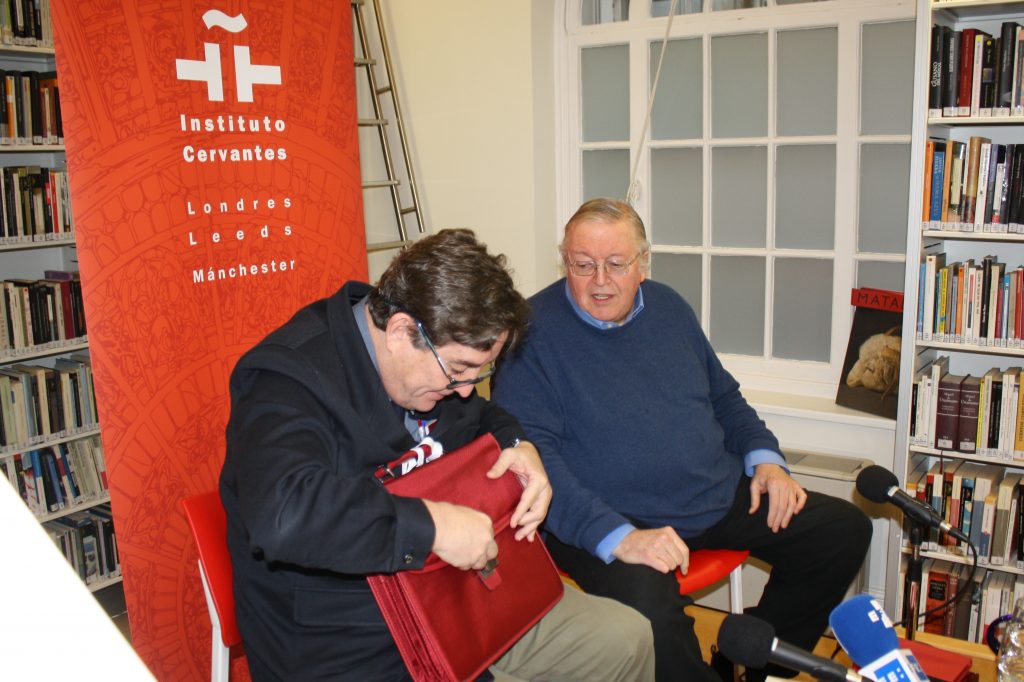
First artifact in La Caja de las Letras made from a distance
The artifact left by Sir Paul Preston is the first one that is made from a distance in the history of Instituto Cervantes. The book donated by the great British historian will travel in a red briefcase guarded by the director of the Spanish institution, Luis García Montero.
With the delivery of his legacy, Sir Paul Preston joins another Hispanist historian Sir John Elliott, the first native non-Spanish speaker invited by Instituto Cervantes to the former vault of its headquarters in October 2017. This month, Irish Hispanist Ian Gibson joined him, choosing to leave as a legacy two books by Gerald Brenan.
The Caja de las Letras celebrated its first decade in 2018 as a time capsule that keeps legacies ceded by cultural personalities in Spanish. Writers, artists, musicians, scientists, filmmakers or actors have left locked-up personal objects that are witnesses and memories of their life trajectory in the former vault of the Instituto Cervantes’ headquarters.
Throughout these years, prominent protagonists of the culture of Spain and Latin America have deposited their legacies in one of the 1,800 safety boxes located in the building known as the Cariátide, in the centre of Madrid. Through their basements, all the writers awarded the Cervantes Prize in the last two decades have passed: Antonio Gamoneda, Juan Gelman, Ana María Matute, Juan Marsé, José Emilio Pacheco, José Manuel Caballero Bonald, Nicanor Parra, Elena Poniatowska, Juan Goytisolo, Fernando del Paso and Eduardo Mendoza.
Narrator and essayist Francisco Ayala, Cervantes Prize 1991, was the one who inaugurated the Caja de las Letras in February 2007 with a secret legacy in box number 2,000. Since then, other illustrious authors in addition to those mentioned, such as Carlos Edmundo de Ory, Pablo García Baena or Jorge Edwards, have left their mark in this peculiar enclave where customers formerly deposited jewels and treasure.
Although writers make up the majority of the boxes (almost twenty), many other expressions of culture are also represented: art (Antoni Tàpies), science (Margarita Salas), music (Cristóbal Halffter, Luis de Pablo), dance (Alicia Alonso, Víctor Ullate), cinema (Luis García Berlanga), theatre (Nuria Espert), interpretation (Manuel Alexandre), photography and edition (Mario Muchnik) or literary management (Carmen Balcells).
The boxes each have a specific opening date, chosen by each guest. There is only one exception: composer Luis de Pablo asked that his safe be opened when he dies (therefore, it is not known when) and that in the same act the unpublished score that he left saved there must be read. So far, three boxes have been reopened: those of the literary agent Carmen Balcells, actor Manuel Alexandre and molecular biologist Margarita Salas.
Among other objects, it is worth mentioning the typewriter of the recently deceased Nicanor Parra, who ceded his grandson in 2012, since the Chilean poet, who was then 97 years old, could not come to Spain to collect the Cervantes prize.
Legacies in memoriam
The Caja de las Letras also keeps four legacies in memoriam, that is, personalities already deceased. Colombian Nobel laureate Gabriel García Márquez retains a box with land from his home in Aracataca. Antonio Buero Vallejo, his pipe and one of the pens with which he wrote the plays. From writer Miguel Hernández, a first edition of his earliest poems, Perito en lunas (1933). And from Argentine singer Atahualpa Yupanqui, handwritten postcards sent to his wife during his trips.
La Secretaria General del Cervantes firma un acuerdo con la Cámara de Comercio para impulsar el español en Reino Unido
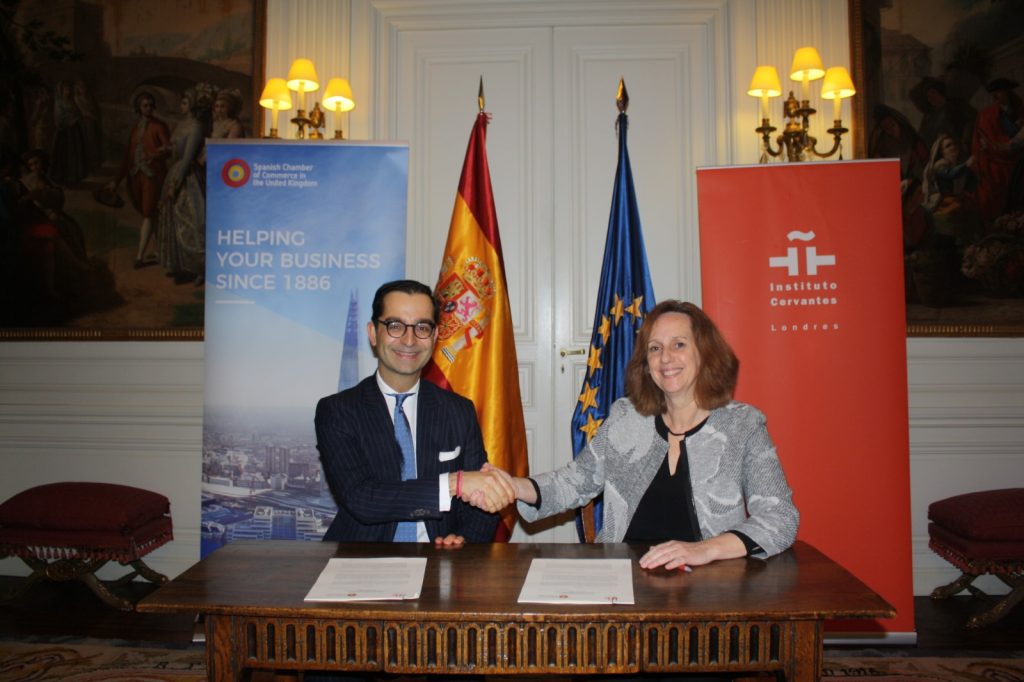
Tras la firma esta mañana del primer protocolo de cooperación entre el Instituto Cervantes y el British Council, la Secretaria General de la institución cultural española, Carmen Noguero, suscribió un acuerdo con la Cámara de Comercio de España en Reino Unido para el fomento de la lengua y cultura españolas. Asimismo, la ‘número dos’ del Cervantes presentó el anuario El español en el mundo 2019 ante embajadores, diplomáticos y académicos hispanoamericanos, por una parte, y ante profesores de español, hispanistas y gestores culturales, por otra.
La Secretaria General del Instituto Cervantes se trasladará mañana a la Universidad de Oxford, donde pondrá punto final a un viaje en el que le acompañan el director de Relaciones Internacionales del Instituto Cervantes, Rafael Soriano; el director del centro de Londres, Ignacio Peyró; y el director de los centros de Mánchester y Leeds, Francisco Oda.
Presentaciones del Anuario ante diplomáticos e hispanistas
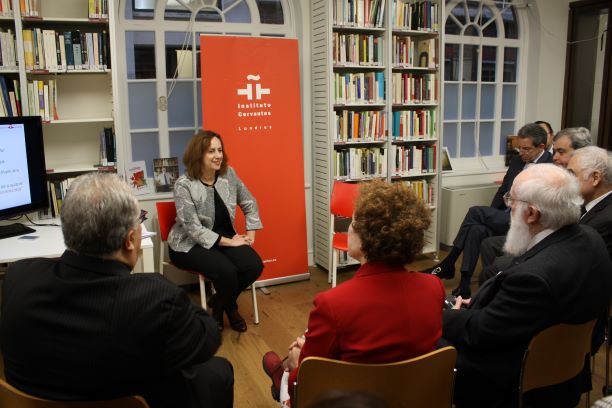
Noguero visitó el Instituto Cervantes en Londres, donde mantuvo una reunión con el personal de los centros de la institución en Reino Unido (Londres, Mánchester y Leeds), y conoció de primera mano la biblioteca y el archivo históricos del centro, notables, respectivamente, por su colección de libros de viajes por España y su documentación de la Guerra Civil.
Su primer acto público fue la presentación de la mayor publicación académica del Instituto Cervantes, el anuario El español en el mundo, en su edición de 2019, ante una nutrida delegación de diplomáticos y académicos hispanoamericanos. En el público estuvieron presentes los embajador de Honduras, Guatemala, Nicaragua, Paraguay, Ecuador, Panamá, Perú y El Salvador, además de Cristina Cortés, directora del think-tank de referencia en asuntos iberoamericanos, Canning House; y la directora de la oficina de la Universidad Autónoma de México en Londres, Ana Elena González, entre otras personalidades. Las distintas sedes del Instituto Cervantes cooperan en materia cultural de modo continuado con las Embajadas y consejerías culturales de los países hispanoamericanos.
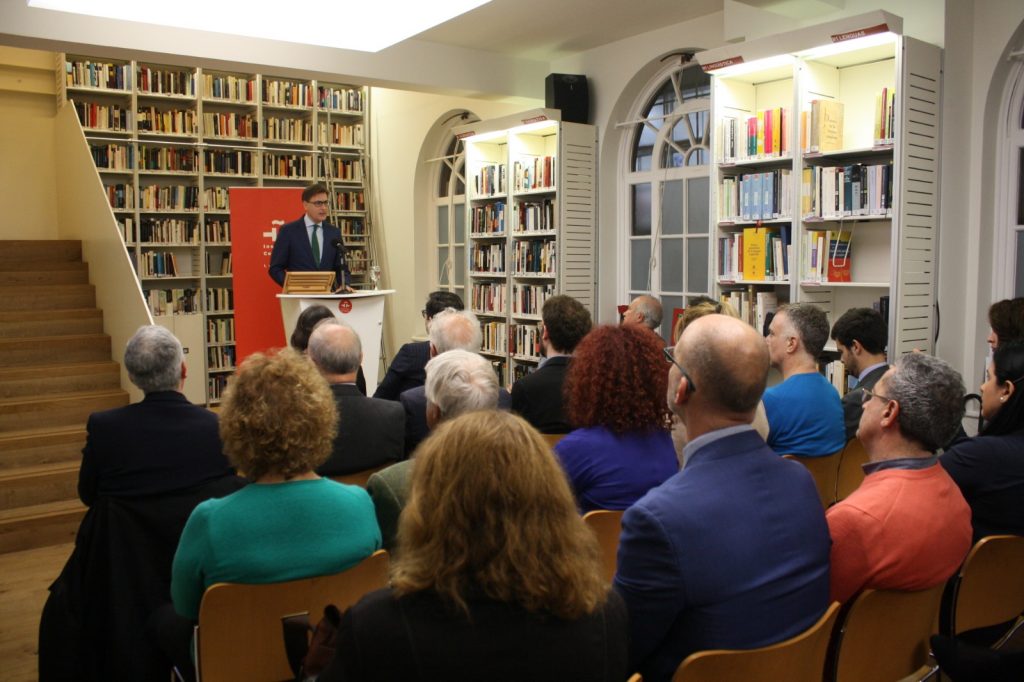
La Secretaria General también presentó su anuario en otro acto destinado a profesores de español en Reino Unido, hispanistas y gestores culturales. Entre los asistentes se pueden mencionar a profesores como Sir Barry Ife, Trevor Dadson, Catherine Davies o Sebastian Balfour, o el presidente de la asociación de docentes de español en Reino Unido (ELE-UK), Vicens Colomer.
El español en el mundo 2019 reúne datos actualizados y análisis en profundidad sobre la presencia e importancia de la lengua española a nivel global. En esta edición, el volumen destaca cifras significativas como los 580 millones de personas que hablan español en el mundo (el 7,6% de la población mundial). De ellas, 483 millones son hablantes nativos, lo que convierte al español en la segunda lengua materna del mundo por número de hablantes. Además, cerca de 22 millones de personas en 110 países lo estudian como lengua extranjera. El español es asimismo la tercera lengua más utilizada en internet, y el informe correspondiente a 2019 refleja, como dato novedoso, su crecimiento en Linkedin.
Firma de un acuerdo con la Cámara de Comercio española
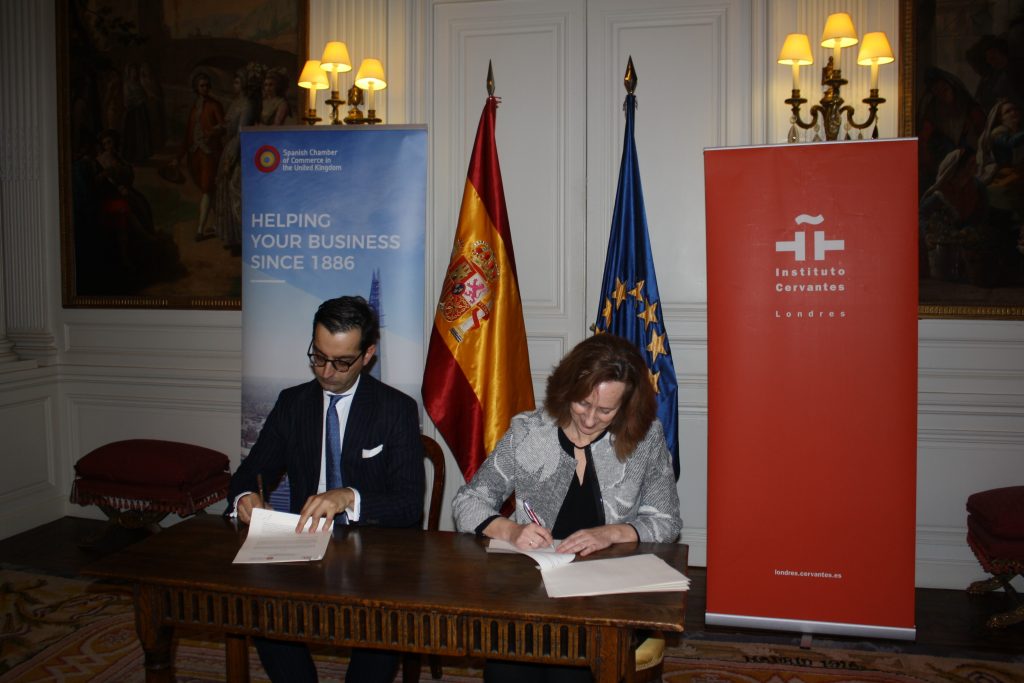
Junto al protocolo firmado con el British Council, el acuerdo suscrito con la Cámara Oficial de Comercio de España en el Reino Unido es uno de los puntos fuertes del viaje. El acto tuvo lugar en la residencia del embajador de España en Londres, Carlos Bastarreche, y contó como signatario por parte de la Cámara con su presidente, el abogado y solicitor Eduardo Barrachina, quien subrayó la importancia del acuerdo como “modelo de colaboración público-privada al servicio de la proyección de la cultura española”.
“La Cámara y sus empresas entienden muy bien que el español y la cultura española son fuente de riqueza. Este marco de colaboración garantiza que la cultura española tenga mayor proyección en el Reino Unido, y con esta firma, la Cámara y sus empresas reconocen el valor económico de la cultura española”, afirmó Barrachina.
En el acuerdo, el primero que firman ambas instituciones, se contemplan diversas acciones de promoción de la lengua y cultura españolas, en especial en el ámbito del español para los negocios. La Cámara aglutina a más de trescientas empresas españolas que operan en Reino Unido.
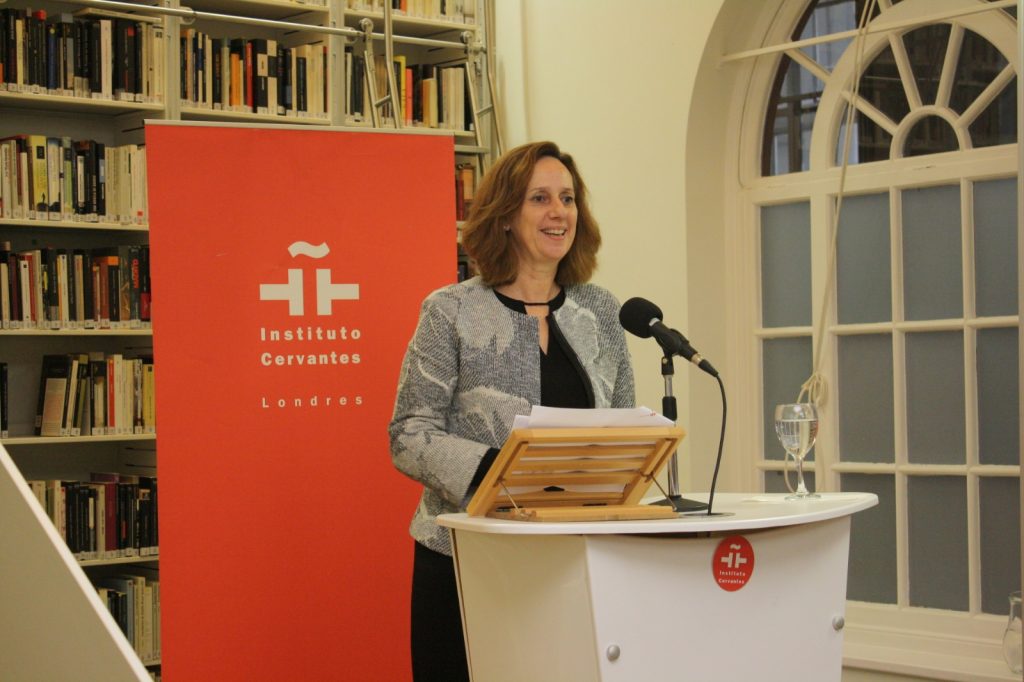
Encuentro con ejecutivos españoles de la City
Al terminar la tarde, Carmen Noguero asistió a la recepción de Navidad de la British Spanish Society, una organización benéfica fundada en 1916 y que promueve la amistad y el entendimiento entre británicos y españoles. Su día culminó con una cena, ofrecida por el restaurante Hispania, con representantes de la Cámara de Comercio y del mundo empresarial y financiero español en la City de Londres.
Visita a Sir John Elliott y a autoridades del hispanismo en Oxford
Mañana, la Secretaria General del Cervantes, como culminación de su viaje, se entrevistará con el gran hispanista y premio Príncipe de Asturias de Ciencias Sociales Sir John Elliott, en la ciudad de Oxford. Asimismo, mantendrá reuniones en Exeter College con las mayores autoridades académicas en hispanismo y docencia de la lengua de la célebre universidad, en concreto, el catedrático “Alfonso XIII” de Estudios Españoles, Jonathan Thacker, y el profesor titular y coordinador de español en la Facultad de Lenguas Medievales y Modernas, Javier Muñoz-Basols. Por último, Carmen Noguero asistirá en Magdalen College a un almuerzo ofrecido en su honor por el catedrático de literatura española Juan Carlos Conde, impulsor del Ciclo Madariaga de conferencias sobre temas españoles, con el que colabora el Instituto Cervantes.
Cursos de español – Invierno 2019-2020
El Instituto Cervantes es el Centro Oficial de Lengua y Cultura Española en el mundo. En Londres ofrecemos cursos diurnos, nocturnos y de fin de semana para todos los niveles (A1-C2 del MCER) los siete días de la semana. Los cursos se pueden tomar una vez por semana, de manera semi-intensiva o intensiva.
También ofrecemos una amplia gama de cursos para necesidades específicas, como prepararse para los exámenes oficiales (DELE, A Level y GCSE), desarrollar habilidades lingüísticas específicas, aprender sobre diferentes aspectos de la cultura o para necesidades profesionales; más cursos de español en línea (AVE Global), clases para niños y capacitación de maestros.
Además de los cursos presentados en nuestro programa, organizamos clases particulares para individuos y grupos en nuestras instalaciones y ofrecemos capacitación en idiomas para empresas, hospitales y escuelas.
Más de 1000 estudiantes disfrutan de nuestros cursos cada trimestre… ¿Por qué no ser uno de ellos?
Spanish, a language spoken by 580 million people, and 483 million of them native
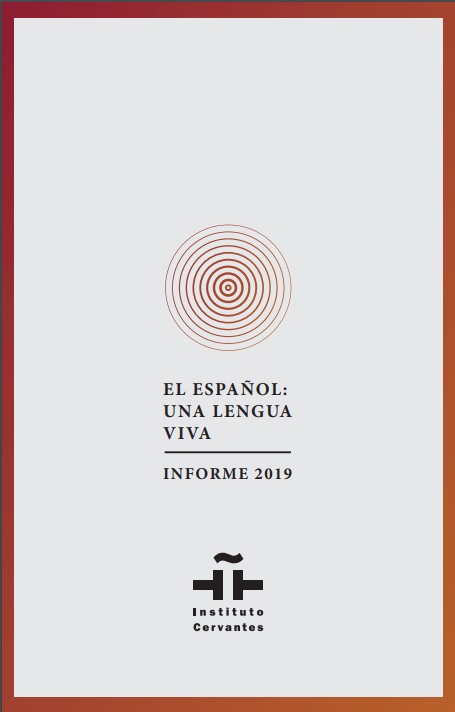
A total of 580 million people speak Spanish in the world, 7.6% of the world’s population. Of these, 483 million – three million more than a year ago – are native Spanish speakers, which makes Spanish the world’s second mother tongue by number of speakers. In addition, studies have shown that these 22 million people span across 110 countries. Spanish is the third most used language on the internet, where it has great growth potential.
Which is unfortunate, montreal online casino bids 100 Bonus Spins for the game Book of Dead from Playn GO are included in this welcome offer!
These are some of the most relevant data collected by the “Yearbook of Spanish in the world 2019”, done by Instituto Cervantes, presented by its director, Luis García Montero, accompanied by people who were in charge for its content, in an event open to the public.
David Fernández Vítores, author of the study, believes that Brexit will be positive for Spanish in the European Union because it will increase the proportion of Spanish speakers. His 90-page study offers an updated and very reliable census of Spanish speakers and contains «very positive and innovative data», such as the importance given to Spanish in the Linkedin network, a space that is analyzed here for the first time .
The first section of the book introduces the updated data on the Spanish language in areas such as demography, teaching and learning, Internet and social networks, science and culture, its international influence and economic value, as well as its diplomatic presence.
Demography:
Almost 483 million people have Spanish as their mother tongue. (The 2018 Yearbook estimated native speakers at 480 million).
The number of potential Spanish users exceeds 580 million. This figure brings together the groups of native domain, limited competence and foreign language students. Last year it was 577 million.
Spanish is the second mother tongue in the world by number of speakers, only behind Mandarin Chinese.
It is the third language in the global computation of speakers (native domain + limited proficiency + Spanish students) after English and Chinese.
7.6% of the world’s population is today Spanish-speaking. The percentage is expected to increase one tenth (7.7%) in 2050.
In 2100, this percentage is expected to fall to 6.6%, mainly due to the decline in inhabitants of Latin America in the face of the population explosion in several African countries, among other factors.
For demographic reasons, the percentage of the world’s population that speaks Spanish as a native language is increasing, while the proportion of Chinese, English and French speakers decreases.
In 2060, The United States is anticipated to be the second Spanish-speaking country in the world after Mexico: almost one in three Americans will be Hispanic.
Study of Spanish as a foreign language:
A total of 21,882,448 students study Spanish as a foreign language (67,000 more than last year), according to data recorded in 110 countries and at all levels of education.
The Cervantes Institute estimates that the real demand is 25% higher, since the data does not also reflect private education.
In the US, Spanish is the most studied language at all levels of education.
In the United Kingdom, Spanish is perceived as the most important language for the future.
In the European Union, France, Italy, United Kingdom and Germany (in this order) are the countries with the highest number of Spanish students.
The teaching of Spanish in English-speaking countries such as Canada (with 90,000 students), Ireland (47,000), Australia (34,000) and New Zealand (36,000) has also grown significantly.
Economy:
The contribution of all Spanish-speaking countries to global GDP (Gross Domestic Product) is 6.9%. A higher percentage than that generated by countries that have French as their official language.
In the case of Spanish, the common language multiplies by four bilateral exports among Spanish-speaking countries.
Spanish would be the fourth most powerful language in the world, slightly behind French and Chinese, and a great distance from English.
Spanish occupies the third position in the UN (United Nations Organization) and fourth in the scope of the European Union.
Spanish on the Internet:
It is the third most used language on the Internet after English and Chinese.
8.1% of internet communication occurs in Spanish.
It is the second most used language on Wikipedia, Facebook, Twitter and Linkedin. Of the 580 users of the Linkedin social network, 55 million use Spanish to a greater or lesser extent. Most of them (43 million), in Central and South America.
Spanish has a high potential for growth on the Internet due to the average internet availability in Spanish-speaking countries (which is 65.8%, still far from penetration in Spain, which exceeds 92%).
Mexico is among the ten countries with the highest number of users on the Internet.
Spanish in science and culture:
After English, Spanish is the second language in which most scientific documents are published.
Although the participation of Spanish-speaking countries in world scientific production has grown since 1996, Spanish scientific and technical research is relegated to a secondary level in the international arena.
Publishing Market:
Spain is the third largest exporter of books in the world, after the United Kingdom and the United States.
Two Spanish-speaking countries – Spain and Argentina – are among the top 15 book producers in the world, according to the International Publishers Association.
Spain occupies the eighth place in book production, and the ninth in the market value of the publishing sector.
Although the publication of books in electronic format is increasingly widespread, its market share is still low in Spanish-speaking countries.
READ THE FULL REPORT: «Yearbook of Spanish in the world 2019»
El español, una lengua que hablan 580 millones de personas, 483 millones de ellos nativos

Un total de 580 millones de personas hablan español en el mundo, el 7,6% de la población mundial. De ellos, 483 millones –tres millones más que hace un año– son hispanohablantes nativos, lo que convierte al español en la segunda lengua materna del mundo por número de hablantes. Además, lo estudian casi 22 millones de personas en 110 países. El español es la tercera lengua más utilizada en internet, donde tiene un gran potencial de crecimiento.
Son algunos de los datos más relevantes que recoge el Anuario El español en el mundo 2019 del Instituto Cervantes, que este mediodía presentó su director, Luis García Montero, acompañado por otros responsables de su contenido, en un acto abierto al público que clausuró la vicepresidenta del Gobierno en funciones, Carmen Calvo.
David Fernández Vítores, autor del estudio El español: una lengua viva. Informe 2019, cree que el brexit será positivo para el español en la Unión Europea porque hará aumentar la proporción de hispanohablantes. Su estudio, de 90 páginas, ofrece un censo actualizado y muy fiable de los hablantes de español y contiene «datos muy positivos y novedosos», como la importancia que se da al español en la red Linkedin, un espacio que se analiza por primera vez.
La primera sección del libro, El español: una lengua viva. Informe 2019, presenta a lo largo de 90 páginas los datos actualizados sobre la lengua española en ámbitos como la demografía, enseñanza y aprendizaje, Internet y redes sociales, ciencia y cultura, su influencia internacional y valor económico, así como su presencia diplomática.
El informe destaca los siguientes datos relevantes:
Demografía:
- Casi 483 millones de personas tienen el español como lengua materna. (El Anuario 2018 cifraba los hablantes nativos en 480 millones).
- El número de usuarios potenciales de español supera los 580 millones. Esta cifra aglutina a los grupos de dominio nativo, de competencia limitada y estudiantes de lengua extranjera. El pasado año era de 577 millones.
- El español es la segunda lengua materna del mundo por número de hablantes, solo por detrás del chino mandarín.
- Es la tercera lengua en el cómputo global de hablantes (dominio nativo + competencia limitada + estudiantes de español) después del inglés y del chino.
- El 7,6% de la población mundial es hoy hispanohablante. Se prevé que el porcentaje aumente una décima (7,7%) en el año 2050.
- En 2100, este porcentaje bajará al 6,6 % debido fundamentalmente al descenso de habitantes de Hispanoamérica frente a la explosión demográfica en varios países africanos, entre otros factores.
- Por razones demográficas, el porcentaje de población mundial que habla español como lengua nativa está aumentando, mientras que la proporción de hablantes de chino, inglés y francés desciende. ·
- Estados Unidos será en 2060 el segundo país hispanohablante del mundo después de México: casi uno de cada tres estadounidenses será hispano.
Estudio del español como lengua extranjera:
- Un total de 21.882.448 alumnos estudian español como lengua extranjera (67.000 más que el año pasado), según datos referidos a 110 países y en todos los niveles de enseñanza.
- El Instituto Cervantes estima que la demanda real es un 25% mayor, ya que esos datos apenas reflejan la enseñanza privada.
- En EE. UU. el español es el idioma más estudiado en todos los niveles de enseñanza.
- En el Reino Unido, el español es percibido como la lengua más importante para el futuro.
- En la Unión Europea, Francia, Italia, Reino Unido y Alemania (por este orden) son los países con un mayor número de estudiantes de español.
- También ha crecido notablemente la enseñanza de español en países anglófonos como Canadá (con 90.000 estudiantes), Irlanda (47.000), Australia (34.000) y Nueva Zelanda (36.000).
Economía:
- La contribución del conjunto de los países hispanohablantes al PIB (Producto Interior Bruto) mundial es del 6,9 %. Un porcentaje superior al generado por los países que tienen el francés como lengua oficial.
- En el caso del español, la lengua común multiplica por cuatro las exportaciones bilaterales entre los países hispanohablantes.
- El español sería la cuarta lengua más poderosa del mundo, ligeramente detrás del francés y del chino, y a gran distancia del inglés.
- El español ocupa la tercera posición en la ONU (Organización de las Naciones Unidas) y la cuarta en el ámbito de la Unión Europea.
El español en Internet:
- Es la tercera lengua más utilizada en la Red después del inglés y del chino.
- El 8,1% de la comunicación en internet se produce en español. E
- Es la segunda lengua más utilizada en Wikipedia, Facebook, Twitter y Linkedin. De los 580 usuarios de la red social Linkedin, 55 millones utilizan en mayor o menor medida el español. La mayoría de ellos (43 millones), en Centroamérica y Sudamérica.
- El español tiene un alto potencial de crecimiento en Internet debido a la penetración media de internet en los países hispanohablantes (que es de un 65,8%, aún lejos de la penetración en España, que supera el 92%).
- México se encuentra entre los diez países con mayor número de usuarios en Internet.
El español en la ciencia y en la cultura:
- Después del inglés, el español es la segunda lengua en la que más documentos de carácter científico se publican.
- Aunque la participación de los países hispanohablantes en la producción científica mundial ha crecido desde 1996, el español científico y técnico se encuentra relegado a un plano secundario en el ámbito internacional.
Mercado editorial:
- España es el tercer país exportador de libros del mundo, después del Reino Unido y Estados Unidos.
- Dos países hispanohablantes –España y Argentina– se encuentran entre los 15 principales productores de libros del mundo, según la International Publishers Association.
- España ocupa el octavo puesto en producción de libros, y el noveno por valor de mercado del sector editorial.
- Aunque la publicación de libros en formato electrónico está cada vez más extendida, su cuota de mercado es aún escasa en los países de habla española.
